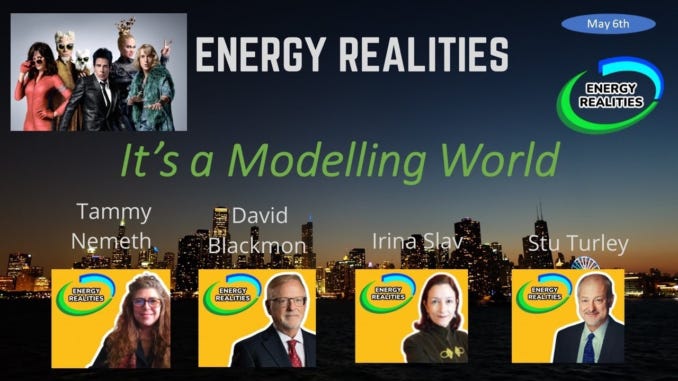What does the Data show us about Net Zero? Or, can you even trust the Data? Check out the International team of David Blackmon, Irina Slav, Tammy Nemeth and Stu Turley live 8:00 Central US. From Bulgaria, UK, and Texas
Highlights of the Podcast
01:00 – Microsoft
02:14 – Biggest problem with these computer models
04:32 – The IPCC
09:33 – Can you trust any data?
11:19 – The banks are now having modeling issues
15:35 – The digital currency
16:54 – The looming disaster in the EV industry
23:01 – About the interconnects
32:19 – Eco-friendly startups are turning to treeless toilet paper
34:42 – Big Shell investors urge others to back greater climate action
37:32 – McKinsey, JP Morgan, Alphabet and others signed $58 billion biomass based carbon removal deal through Frontier
40:56 – The G7 coal exit goal puts focus on Germany, Japan and US
42:09 – Datacenters now need a reactor’s worth of power, Dominions Says
45:08 – Carbon Capture
49:04 – Net zero’s days are numbered. Why Europeans are souring on the climate agenda
50:09 – Life after net zero
55:15 – The Great Barrier Reef
57:04 – Real big disaster
The Podcast Hosts for The Energy Realities
International Author writing about energy, mining, and geopolitical issues. Bulgaria
Principal at DB Energy Advisors, energy author, and podcast host.Principal at DB Energy Advisors, energy author, and podcast host.
Energy Consulting Specialist
President, and CEO, Sandstone Group, Podcast Host
It’s a Modelling World – Energy Realities LIVE
Stuart Turley [00:00:00] All right. All right.
Tammy Nemeth [00:00:15] Hello. Welcome, everybody, to the Energy Realities Podcast and our fantastic and knowledgeable team. We have the ever witty Irina Slav, the compiler of Absurdities David Blackmon, the irrepressible Stu Turley, and me, the discerning Tammy Nemeth. Hi, everybody.
Irina Slav [00:00:38] Hello.
David Blackmon [00:00:38] Good morning.
Tammy Nemeth [00:00:41] So today our topic is modeling, not the catwalk variety, not the Zoolander going, but the computer kind, the unreliable garbage in, garbage out kind of modeling. And this topic was actually inspired by a recent announcement from Microsoft. So if you thought Microsoft is bad for glitches and unexpected crashes, and that computer modeling for climate was prone to significant error. Now imagine what happens when those two things combine, because Microsoft has a new sustainability manager that uses climate modeling and, whatnot to determine the emissions, impact of business decisions. So you can I’m just trying to imagine how great this is going to be for companies to combine those two uncertainties.
David Blackmon [00:01:38] Yeah. I mean, what’s going to happen to you when it gets hacked? You know, I it always amazes me people rely on Bill Gates and Microsoft, you know, for stuff like this. When, when Bill gates intentionally designed a platform that is vulnerable to being hacked and refuses to fix it. You know, I would assume that this tool, would be about as valuable as anything else Microsoft puts out.
Tammy Nemeth [00:02:04] Yeah. I read it. What do you think of that tomorrow article about the.
Irina Slav [00:02:10] I mean, it was amusing, certainly, but my biggest problem with these computer models is that it’s humans that input information and parameters and whatever it is. Humans are not without bias. All of us have biases. So how do you guarantee that the people doing the inputs into these computer models are not manipulating these inputs to get the result they want to get? Can this be guaranteed?
Tammy Nemeth [00:02:45] Right. And what’s the margin of error on any of it?
Irina Slav [00:02:48] Well, I’m not talking about margin of error. I’m talking about conscious or unconscious, but rather conscious bias that is being included in the modeling because the authors of the models want to get a certain result.
Tammy Nemeth [00:03:07] Yeah.
Irina Slav [00:03:08] Or maybe I’m just being paranoid and, you know, to to suspicious of everything. I am suspicious of technology. But precisely the reasons pointed out by your right to me is the fact that we have a human factor in. It’s it’s crucial, this human factor, because the computers don’t create the models on, on their own. Even artificial intelligence, as we saw. Remember the Gemini? Google’s was Google’s. Chug bottle. Whatever. It was so heavily biased, they pulled it. You, they had to call it, you know, almost immediately. It was it was amazing. And it’s like have issues. Yeah.
David Blackmon [00:03:51] It’s like it’s like, relying on if you’re a conservative. It’s like relying on CNN to conduct a presidential preference poll. If you’re a liberal, it’s like relying on Fox News, right? I mean, you don’t trust it because of the source. And and public opinion polling works essentially the same way as as these these climate models work. They are there. And and unfortunately, there’s also this general misperception in the media. About how to portray climate models, the outcomes of climate models. And we see that with the IPCC modeling process every year, because if you actually read the details of the UN, IPCC annual studies that they do, they very rationally write about what the findings mean and what they don’t mean. Okay. And they, you know, put, probabilities of outcomes to all the scenarios. They’ll, they’ll run various different scenarios with different inputs, to, to, come up. And they always come up with a wide variety of outcomes, possible outcomes. But in the media. The headline is always. The most extreme thing is going to be true, right? I mean, that’s what it is. It’s always IPCC finds that, global warming is going to be 3.2°C by 2050. If we don’t. If we don’t, change what we’re doing. But that’s not what the IPCC people themselves say at all. And, and so, you know, there’s a validity to modeling. As long as you understand what the outcomes actually mean and what they don’t mean. And unfortunately, the general public simply does not get that from the media reporting on them.
Irina Slav [00:05:54] Yeah. And a lot of that is coming from outlets that have vested interests to get a certain result. This is related to, you know, the the devolution of science in recent years, when science seems to have become not a way to learn more about the universe and the world and whatever, but just to get certain results to get the results you want, which is the opposite of how science is supposed to work. It’s like they start with a hypothesis and the desired outcome. And not everyone, of course, but a lot of people in science, it seems, just try to get to a certain result, which shouldn’t be how science works. It’s not how actual science works. You wanted to prove or disprove a, hypothesis, depending on your experimental data and so on and so forth. But yeah.
Tammy Nemeth [00:06:48] Yeah, that’s an extremely important point to make. And if I could add in there, like, for example, the IPCC had generated all of these different, RCP, which is representative, try to remember the representative concentration pathway. And so they had these different scenarios that they ran. And 8.5 was like this extreme case that, you know, that it was probably never going to happen. It was just outrageous kind of inputs that they put into it. And then they had a series of other ones that were more moderate and and whatever. But the central banks and a lot of the different organizations took the RCP 8.5 as business as usual. Right. So they took an extreme case. Then they said, that’s business as usual, and we want you to try and model your business behavior and risk analysis around that extreme thing as being the norm. And unfortunately, a lot of the, the different, groups that are supporting this, the different banks and financial institutions, as you say, arena, they probably have a vested interest in having that as their extreme position, because there’s this desire to shift investment fund financing or funds and financing to the transition, and no one’s going to invest in a transition if they think, well, it’s not going to be so bad. Why why do we need to spend money on that? And so now they’re they’re working that extreme scenario into this business as usual for, for banking, which I find rather troublesome.
David Blackmon [00:08:33] Right. Stu, What do you think?
Stuart Turley [00:08:39] I am sitting here taking it all in this morning. And I’ll tell you the only time that I’ve ever met Bill gates. I am so thrilled that I have it on my resume that I made that man so mad he had to go get therapy. I’ll tell you what. That man is absolutely a. Horses. When we sit back and take a look at, Microsoft and we take a look at the hypocrisy that they actually stand for, they are built upon hypocrisy. Data manipulation now is actually getting into a completely scary thing. And in my one of my stories for today was my interview with Fritz, running, who is on the, CO2 coalition now in weather modification data is they found a way to do it. Can you trust any data? I don’t trust a single thing that comes out of the United States government. Did I just say that? What about the, eaa. They’re manipulating the data. It is proven. And they’re going. Well, yeah, we did. In order to get a, lower pricing in manipulating oil prices. Why should we trust anything anymore?
Irina Slav [00:10:03] No we can’t. And Wood Mackenzie is the latest to completely fall. Yeah. In terms of reputation, now, they’re modeling the climate to. Now they’re warning that a five year delay to the transition will cause the global average temperature of this fiction of a metric to to shoot about three degrees Celsius. Oh my God.
Stuart Turley [00:10:29] Well, let me ask the panel.
Irina Slav [00:10:30] And then in in another recent report. Sorry, Stu. Theyre talking about EVs and how they’re going to decimate oil. Sorry petrol demand drove this year. What? Yes.
David Blackmon [00:10:46] Which is the diametric opposite of what is actually happening.
Tammy Nemeth [00:10:49] Oh, yeah. Good.
David Blackmon [00:10:51] I mean, it’s 180 degree opposite.
Stuart Turley [00:10:56] You know, when we sit back and we think, okay, we’ve got the modeling going on and it’s not like Zoolander like we had on the in the intro slide there. Love Ben Stiller. He’s he’s absolutely a nut. And and we sit back and we take a look at the modeling and, we take, look at where we are going, from here. The banks are now having modeling issues as well. And there’s now, I think his name is Christian Saint Clair. He says there’s about 250 banks that may be failing in the US because of the financial modeling going on and the fed not being able to do their job. So it’s not just climate change modeling that is having a problem. What happens if we have 250 banks in the US fail again?
Tammy Nemeth [00:11:51] Oh, that’s a good point. Yeah.
Stuart Turley [00:11:54] Yeah I know. Newlander just expanded into the whole banking industry today.
Tammy Nemeth [00:12:00] We live intricately linked. It’s inextricably linked to all of this, right? Because when you have an oil and gas development or any kind of business, you need financing, unless you have a lot of cash there. And most businesses operate with some sort of debt financing, whether it’s to for initial startup or ongoing expansion or whatever. And so there’s this, this link between what the financial services industry is doing, the banks and investors, and then how this plays out in the in the larger context of the economy. Oil and gas industry, transition industries, and so on. But as I said, you know, Mark Carney had talked about back in 2019, I think it was where they need to shift 100 trillion, find like, financial support and investment to the transition. Where how are you going to get that? Because if you focus just on business models and everything, the conclusion would be, well, this isn’t a good investment. I think we’ll just stick with what what we’re doing. But so when you make it the only game in town, the way the standard setting is going and so on, there will be no choice but for companies to put their money into the transition. And the way to push them into it is to have these scenarios that are unreliable. And, you know, the thing is, why not have a scenario and have one company do it, or one bank, do it for five years and see if it’s working because none of these scenarios work.
David Blackmon [00:13:36] For example.
Irina Slav [00:13:37] To work, it’s essential, right? But, I’m beginning to think that Mark Carney is just, you know, throwing figures around 100 trillion. We can’t. Yeah, we can’t even get $9 trillion annually for the transition. And he’s talking about 100 trillion. But you know about and gas companies and debt financing. Very good point you made. Did you guys see the surprise when Bloomberg reported said that oil and gas companies, taking out less debt financed from banks because they have. Yeah, they have more cash. Why do they have more cash? Because their products sell because people need them. So they.
David Blackmon [00:14:23] You have a successful business.
Irina Slav [00:14:25] Nobody expected this. Yeah. Well, yeah. From becoming more independent, they’re investing their own money into new projects. And this is a problem that nobody saw coming because they expected that when when they pressured banks to stop doing business with oil and gas banks would stop doing business with oil and gas and oil. Gas will stop expanding production because they don’t have, you know, debt financing. Surprise. They have cash.
David Blackmon [00:14:52] Yeah, yeah. Well, here’s the sustainable business model. Yeah.
Tammy Nemeth [00:14:56] Here’s an interesting addition to that point is that not only are a lot of oil and gas companies, at least the smaller ones are kind of they’re trying to stop the debt financing and they’re going to private investment. And but I think it was either the IMF, I think it was the IMF or maybe the BIS. Put a note out to nations saying you need to start regulating private investment so that it doesn’t undermine the transition. And I know that, you know, now you want to control private investment so that.
David Blackmon [00:15:35] That’s what the digital currency is all about. If the if they can take you to a digital currency, they can control everything you do and they can force you to invest your money the way they want you to. Investment, invest it if they can control. The government controls everything through a digital currency. You won’t be able to participate in society unless you behave the way the government wants you to behave.
Irina Slav [00:15:58] Yeah, but that that will not work. Not at this stage in human history at all. Because what? What am I saying? It will just make oil and gas companies richer. Because once again, they’re selling a product that is very necessary, that is vital. And you can’t ban oil and gas just like that.
David Blackmon [00:16:17] No, I don’t think you can, but these people think they can. I mean, all you have to.
Irina Slav [00:16:21] I think that you do a lot of things that things that are actually impossible.
David Blackmon [00:16:28] Exactly, exactly. Yeah. I mean, there’s a great example. There’s a, Financial Times article, speaking of another formerly reputable publication that is going crazy. Financial times articles written by a lady named Helen Thomas. It’s not the same Helen Thomas that we’ve known for many years on the white House press corps. I think she actually passed away, but it’s a younger Helen Thomas writes a story, about, the looming disaster in the EV industry. But what she does is she she complains that, well, you know, the the car companies haven’t gone in all in on EVs only. See, the problem is not that the EV model doesn’t work, it’s that the car companies have not just gone willy nilly all in to electric vehicles. Well, think about if Ford Motor Company had in 2021 decided we’re going to stop producing all our all our, internal combustion cars are incredibly successful line of SUVs and Ford F-150 pickup trucks and everything else. And we’re just going to we’re going to put out this electric F-150 and this electric Mustang and a few other electric models, and it’s all going to be great. Well, you know, if they had done that in 2021, Ford Motor Company would no longer exist because they’ve lost something like 12 to $14 billion on their EV line because people don’t want to buy them. People don’t want them. And so if we did, but then Tammy had a great suggestion. We need to have somebody do this for five years, see how it works out. Well, let’s try that with with a car company like Ford going all in on EVs and letting them do it for three years and see where they are financially three years from now. And, and what happened is that company will no longer exist. And that’s why they don’t do it. You know, it’s just it’s, it’s an unworkable model that can only. But but, but these people who are religious zealots, where the climate is concerned, they truly believe they have the hubris inside them to believe that government policy can force markets to behave in a way that markets are not inclined to behave. And and, you know, people like these, these zealots have made that mistake over and over and over again throughout human history. And the inevitable outcome is always a financial ruin. And. Now that’s really what the outcome of all this is going to be if we don’t change direction.
Tammy Nemeth [00:19:06] Well, wasn’t her big complaint. The fact that, that all the, the auto manufacturers needed to do it at once, they all of them had to stop selling profitable vehicles because then they’d all be in it together.
David Blackmon [00:19:20] Yeah,.
Tammy Nemeth [00:19:20] You know,.
David Blackmon [00:19:21] We all fail the same time.
Tammy Nemeth [00:19:23] No. All fail at the same time because it’ll be the only game in town. And so you will have no choice but to buy the EV. And then I think what would happen is that the used internal combustion engine market would go, go crazy.
Irina Slav [00:19:35] Oh yeah,.
David Blackmon [00:19:36] The whole world.
Tammy Nemeth [00:19:37] Would be like you wouldn’t want. Yeah, exactly. I keep thinking of them and I’m trying to imagine the UK and in five years time being like Cuba, people fixing their own old cars and not being able to drive because the emissions are violating the town boundaries or something like that.
Irina Slav [00:19:57] And yeah, yeah, it’s already kind of happening because the, you know, the, the Bulgaria and Romania, some of the biggest markets for second hand cars coming from Europe, when Western Europeans used to change their cars every five years or so, now they’re keeping them for longer because life is more expensive in Western Europe. And immediately prices on the second hand car market here have gone up. Yeah.
Stuart Turley [00:20:24] All right. Let me. Me ask the panel this because I’m a little bit of a bonehead. The guy, I am surprised. And the guy they just put out on, on Twitter said that he brought his Tesla in for a update. I love Elon. B, I absolutely want a Cybertruck. I don’t need a Cybertruck, but I want one because it’s bulletproof. And if you’re a bonehead like I am, you need to.
David Blackmon [00:20:52] Wait a couple years. You’re going to be able to get it for a little bit of nothing.
Stuart Turley [00:20:56] I think I’ve already got it. 220 watt or connection for sitting right in my garage. So yeah, but when we get into this point of, Elon Jamie Diamond, and Larry Fink just said in his, annual report on March 27th, the world’s most influential said the switch to energy. Pregnant. Magnetism is that energy security is just as important in the move to net zero. He said, boom. Do do do do do do do do we still need oil and gas? So even Jamie that wow. You know, Jamie Diamond just put out on his yesterday. He said, it’s okay to invest in in oil and gas. So here are the two biggest financial firms saying it’s okay to invest in oil and gas. Where’s the energy hypocrisy now?
David Blackmon [00:21:54] Elon Musk says the same thing. Elon Musk has many times said publicly, we’re going to need oil and gas for a long time. I mean, it’s no mystery. The really smart people understand this. It’s the crazy people that we have to worry about.
Tammy Nemeth [00:22:10] Well, I mean, you can’t get a rocket to space with electricity.
Stuart Turley [00:22:17] But, Tammy, what if we get a big solar panel, put it in space and it have a long electrical cord, come down and have a tethered. That has been proposed.
Tammy Nemeth [00:22:30] Yeah, I know, I know. And there’s also the other space based solar where they beam it down to specific areas and fry everything on the way. You don’t want to be a bird flying across, you know, because it’d be like a huge laser beam or microwaves and just zap everything. But that’s I mean, there’s proposals out there and there’s people raising money and they’re getting subsidies and incentives to explore these ideas.
Stuart Turley [00:22:55] So without derailing the conversation, which I normally do. What about that? What about the interconnects? Is it the Viking interconnect that has come online is now celebrating some big things in the UK. What is the cost per kilowatt transmitted? You know, as it goes through there, because it’s been since 2019 to get this interconnect up and running. How in the world if we can put in interconnects to support the UK? There’s what, three of the three big ones now and they’re bringing them in from Norway and the other countries. They’re expensive and they’re saving the planet. Right? Yeah.
Tammy Nemeth [00:23:38] But they are expensive. I’m not really sure. Because the way they. Hey do these things is. It’s so.
Stuart Turley [00:23:50] I’m not sure if it’s me. Or is it?
Irina Slav [00:23:52] No, it’s not your
David Blackmon [00:23:54] We’re losing Tammy’s connection.
Stuart Turley [00:23:57] Well, she looks good.
Tammy Nemeth [00:24:01] Yes. Sorry. I don’t know what happened.
David Blackmon [00:24:03] It just let me go. Nuts. Nuts. Unfrozen.
Stuart Turley [00:24:06] I thought she was doing a Biden imitation for a brief moment.
David Blackmon [00:24:12] Repeat what you were saying there, Tammy.
Tammy Nemeth [00:24:14] Not that old yet. Yeah. I’m sorry. I have no idea how much the Viking interconnect is costing per kilowatt hour, because the way the the UK does their pricing is really odd, and it seems to fluctuate. I don’t know, but this is the problem with the UK, for example, is that they’re they want to rely more on the interconnects than building their own power, because it’s so expensive to build their own power with all of the different planning requirements and, and whatnot. And my concern is that, like in Canada, they want to do the same thing where they’re saying, okay, Saskatchewan and Alberta, you guys don’t have that much hydro. Just build up your interconnects and import electricity from Quebec or Montana or North Dakota or something like that. And I said, well, what about security? What about energy security? Why would you want to be dependent on these long interconnects? I mean, the one, the UK one, the I think the Viking one is from Denmark. So what happens if there’s some kind of sabotage that takes out that that that line? Now what? Right. So how how are you secure then? And I mean, granted, there could be, similar terrorist attacks or whatever on your domestic infrastructure on land, but it’s different than these really long interconnects, especially undersea, which is what is how Denmark in the UK are connected.
Stuart Turley [00:25:42] I would not want to rely on the United States for energy security under the current administration.
Tammy Nemeth [00:25:51] Yeah. I mean.
Irina Slav [00:25:52] Then so the.
Tammy Nemeth [00:25:54] The countries that are importing your LNG, technically they’re relying on the U.S. for their energy security. So if you if if you put that in.
Stuart Turley [00:26:05] And I’m going to I’m going to say this, there’s a there’s an interconnect in importing LNG. Qatar is putting out, you know, large amounts of LNG. And then here’s a prediction. The Dart fleet is been able to, have a very significant impact on Russia’s ability to be successful, to avoid sanctions. And we’re seeing now coming up with the advent of some LNG tankers coming in that you’re about to see a dark fleet for LNG coming in so that Russia will be able to avoid, LNG sanctions and still ship in some things.
Irina Slav [00:26:46] So now we don’t have that LNG sanctions because Europe is one of the biggest buyers of Russian LNG yet. And so trying to be sanctioning about it.
Stuart Turley [00:26:59] The interconnects are direct and those are something if you’re, you’ve got sanction and weaponization of LNG, there’s other sources of LNG. So that to me is a significant difference. And and hats off to Putin. He, he is an animal. And I don’t agree with everything he does. But he’s avoided sanctions very nicely in the weaponization of the US dollar.
Tammy Nemeth [00:27:27] My understanding is that China has just commissioned 18 maximum size LNG carriers now, I.
David Blackmon [00:27:35] Assume for cutter. Yeah.
Tammy Nemeth [00:27:37] Yeah. And I think.
Stuart Turley [00:27:38] And there’s over 80 under contract now 80 new LNG tankers. What this is doing is this is creating a secondary market of older LNG tankers. That was the whole berthing reason of their fleet. There’s there’s between 500 and 700 of the dirt fleet. Oh how funny. And so the Dart fleet.
David Blackmon [00:28:07] Actually.
Stuart Turley [00:28:08] We love Joanna. Way to go, Joanna. Yeah. And so the Dart fleet came around because of the weaponization of the US, Petro dollar. Yeah. And it’s coming around on the LNG tankers. Everybody says, oh, it’s not around on LNG watch yet.
David Blackmon [00:28:26] Yeah, it’s here’s what I want to know about these these long interconnect lines coming in from Norway and Denmark into the UK. What is the line loss percentage on that electricity? A lot because I know in Texas when we transport wind through high voltage, transmission 3 or 400 miles from south Texas up to Dallas, the line loss is 20% or more. These lines you’re talking about have to be 7 or 800 miles long.
Stuart Turley [00:28:53] And under the.
David Blackmon [00:28:54] Illusion on off a lot of that electricity. And that’s going to race. A lot.
Irina Slav [00:29:00] That’s a lot. Yeah. Yeah. Yeah.
David Blackmon [00:29:03] Oh, yeah. And that’s just the 300, 400 mile long line. You know, line losses is a real issue in the, in the power sector that people don’t think about enough. You know, and this comment from Joanna, it plays into that because she’s right. AOC and the federal government are trying to, coerce Ercot, our grid manager in Texas, to establish interconnections with with the other regional grids in the country. We have a standalone grid. And, that’s going to make us dependent. It’s inevitably going to reduce, the the incentive for the Texas government to ensure that our grid is functionally sound, because we’re going to be Ercot is going to be able to say, well, we don’t really need that new generation over here because we can just rely on getting it from Arkansas in an emergency. Well, Arkansas is probably in the same weather emergency that Texas is in, right? The big freeze in 2021. You keep hearing people talk about while if only Texas was interconnected to these other grids, well, all those other states were frozen. Two folks. We weren’t the only frozen state, okay? We just had the only grid that failed. Okay, so so we need to fix our grid, not rely on Arkansas and Oklahoma to fix it fast.
Stuart Turley [00:30:27] Meredith. Joanna’s, Tammy. Joanna is talking about Meredith Angwin, who was, a a on the, whose visit, I believe, with, everybody here. And I just love Meredith England and. Wonderful.
Tammy Nemeth [00:30:44] Yeah. And, Joanna says here Meredith’s number three in the fatal trifecta over interdependence is interdependence on a neighbor’s grid. And that’s absolutely right. And the thing is, when it was when they had the Dunkel fallout in, Europe, which is where you get the wind stopped blowing and it was calm for weeks. And so if we were all interconnected between the UK and Germany and all these other countries that were all facing the same weather at the same time, what good does that interconnection do? Now, it’s one thing if you are if you’re producing reliable power, whether it’s from nuclear or natural gas or coal or whatever, but what they’re talking about is increasing those interconnects with renewable or unreliable, weather dependent, wind and solar. And now maybe with with France expanding its nuclear fleet, then they would want to be reliant more on France and historically France and the UK. Maybe not the best partners work.
David Blackmon [00:31:49] Out until the next bar, but.
Tammy Nemeth [00:31:50] You gotta work it out.
David Blackmon [00:31:51] Then it’s a.
Tammy Nemeth [00:31:51] Problem. But. Yeah. So maybe we should get to the the headlines today.
David Blackmon [00:31:58] Yeah. Let’s go to the headlines. This is fun. Who’s up first?
Stuart Turley [00:32:05] And let’s get ready to rumble. Whoops.
Tammy Nemeth [00:32:08] Okay.
Irina Slav [00:32:14] Oh, these are mine. And the first one, the eco friendly startups are turning to treeless toilet paper. This one specially here. David.
Tammy Nemeth [00:32:26] It’s made out of.
Irina Slav [00:32:28] Bamboo, which we discussed, sustainable toilet paper or toilet paper set. So, let me just mention some of the names of these sorts of. So I got Whole Foods with. Okay, green forest, my friend who gives a crap is the name of stuff that nice? Well, then that’s it toilet paper. So basically the the story, but the CNBC stories about one of these companies called Real Paper, which makes its, toilet paper from bamboo. And, take note of this sentence, bamboo is a grass, not a tree. And obviously it’s one of the fastest growing and so on and so forth. So you can harvest it more, more often. I have a question. It sounds great. Yeah. Why hasn’t anybody done it yet? Why do we still keep using, lumber or, you know, tree fiber to make toilet paper? If bamboo bamboo is abundant, it is a grass. It’s probably easier on the environment. Why aren’t we doing it already? Probably because it’s more expensive, I don’t know. Yeah.
Tammy Nemeth [00:33:47] Or you have to do something to chemically bind it or something. Maybe. I don’t know.
Irina Slav [00:33:53] How I imagine that. I have no idea at all. So. But they’re saying it’s got great promise. The alternative to sustainable toilet paper is buying a bidet. Yeah. I was thinking about this, however, because bidets using a bidet requires water. So the story ends with the recommendation that if you live in a place that has got abundant water resources, then you’re better off. It will be more more sustainable will be there. If you live in a drought prone area, then you should use bamboo toilet paper. That’s a solution to every problem these days. And every problem is climate change. Yes. Yeah. Okay. My next story was actually two stories in one. This was the first one. Big Shell investors urge others to back greater climate action. And, this is about, you know, the shareholders meeting and a group of shareholders, including a couple of large asset managers, European asset managers calling on the company to, you know, be more ambitious in its, emissions reduction plans. And lo and behold, who was the actual originator of the idea? It was follow this. The well known activist shareholder scheme. It wasn’t the asset managers themselves who had this idea that we’re just going to follow this. But. At the meeting. Apparently, shell said that shell was called on by analysts to return more cash to shareholders because it did so well. It that, you know, forecast beating first quarter. It’s booked a net profit of $7.7 billion. So analysts said you should be returning more cash to shareholders. And shell said no we won’t. That just understand that current share by buying program? Yes. Why should you return more cash to shareholders who want you to not have these profits? Meanwhile, in BP, the joke continues. Meanwhile, BP shareholders are calling for even laxer emission reduction targets. Large institutional shareholders want BP to not reduce its own gas production in the name of emission cutting.
David Blackmon [00:36:20] Because they want perfect. Of course.
Tammy Nemeth [00:36:23] Return on investment.
Irina Slav [00:36:25] Yeah yeah yeah yeah. What a not concept. You know, so that that was that was for me.
David Blackmon [00:36:33] Just I just love that, you know, with shell, of course, is a company that, the irony, it’s just crazy because shell is one of the most aggressive companies in terms of reallocating a bigger share of its capital away from all the wind stuff and renewable stuff they had been investing in that was non-profitable. Back to their core oil and gas business over the last 12 months, and the result is record profits. Gee, what a surprise.
Irina Slav [00:37:05] Yeah.
Tammy Nemeth [00:37:07] Okay. The next one. Is this? Is this my story? Or whose story is this one?
David Blackmon [00:37:18] Not mine. Stu is that yours?
Stuart Turley [00:37:22] not mine.
Tammy Nemeth [00:37:23] Okay, so then it’s mine. Like as I said earlier this week, a jerk because I put different ones in there. Yeah. So this line says McKinsey, JP Morgan, alphabet and others signed $58 billion biomass based carbon removal deal through frontier. And so when you read the headline like, okay, biomass removal, what does that mean? And then when you read the article, it’s basically taking human waste or animal waste that you would normally, the animal waste you would spread on the fields or whatever, but they’re going to put it underground. So they’re going to take out stuff that you could be using as fertilizer or soil nutrients or whatever, and they’re going to bury it. And what what I. Because that’s removing carbon.
Irina Slav [00:38:19] What was it? Methane in the animal waste.
Tammy Nemeth [00:38:24] Well, sir, when the when the waste goes into the fields, even though it’s, it’s putting, nutrients back in the soil or whatever it does, I guess there is a bit of outgassing. And I guess to prevent the outgassing, they’re burying it, but you’re removing those nutrients from the top layer of soil and you’re sitting around.
Irina Slav [00:38:45] So we’re not using synthetic fertilizers because they’re made with natural gas. And now we can’t use natural fertilizers. Right. Because of yes.
David Blackmon [00:38:55] This is my recipe you’re supposed to do.
Tammy Nemeth [00:38:59] Yeah. The new thing is, regenerative agriculture, which can be good, but but you’ll never get the same kind of yield because it’s like, it let’s say, for example, you you sow a crop of wheat and then alongside your wheat crop, you also plant beans because the beans will put nitrogen into the soil. And so you get a complete field cover. You still have to use some kind of insecticide or, or herbicide or something, but it’s supposed to put the nutrients back in the soil to help the wheat grow and all this other kind of stuff, which on the, on the surface it may sound okay, but I don’t think that will create enough yield of what you currently current farming does. So it’s seems to be more of a niche sort of area. Kind of like wind and solar is a bit of a niche, not for all that we need, but that’s the trend. So it’s rather concerning that, you know, they’re talking about soil degradation and lack of nutrients and whatever. But we’re taking those nutrients now and putting it underground storing it.
David Blackmon [00:40:10] My goodness.
Tammy Nemeth [00:40:12] Okay. So that was concerning. This is one. David, is this one yours?
David Blackmon [00:40:22] No.
Irina Slav [00:40:28] The Daily Mail is yours I think. Tammy.
Tammy Nemeth [00:40:34] No, I. Remember that, David had or Stuart sent this one.
David Blackmon [00:40:38] Well, I had the G7 colleagues at. Article in mind, but I didn’t have the one from the Daily Mail, I don’t think.
Stuart Turley [00:40:46] Who had.
David Blackmon [00:40:47] One. These are mine.
Stuart Turley [00:40:49] Okay. All right, so then I’m not sure who that one was, but that one was David’s.
David Blackmon [00:40:54] Okay. So the G7 coal exit, of course, is the announcement by the G7 last Wednesday that, that all those countries have pledged to phase out coal, by 2035. But, they put a couple of big caveats in there. First one is they’re only talking about unabated coal plants, which, as they define it, is a coal plant that’s not accompanied by carbon capture and storage projects. Okay. Well, the problem with that whole concept is that right now, there’s not a single coal plant in the United States of America today that has been successfully combined with a CCS project. Okay. So we’re talking about an exception that the critics of this are saying, well, that gives the United States and Germany and Japan and out, except that they’ve never succeeded in combining those two technologies together in the United States. This is, by the way, the same policy the Biden administration adopted in its new, Clean Power plan that’s going to get overturned by the courts because it’s not a proven technology. The second one is, datacenters now need a reactor’s worth of power. Dominion says this is, a pretty incredible story I wrote about last week. That, Dominion, of course, is a big power provider, over on the East Coast that we’re talking about a handful of data centers that are being built right now in Northern Virginia. And I want you all to remember that geographic location for a specific reason. Dominion said last week that just that handful, I think there’s five of them of new data centers, is going to consume a nuclear reactor worth of power. That’s a gigawatt of power for five data centers being built in Northern Virginia. Dominion also added that it has provided power to Is contracted since 2019 to provide power to 84 other data centers that are up and running, and those 84 combined use less power than these five data centers that are right now being constructed in Northern Virginia. And what I want you to realize about the geographic location of Northern Virginia is that it is home to all the alphabet agencies of the United States intelligence community, the CIA, the FBI, the NSA, and on and on and on. So those five data centers are most likely being built to service the needs, you know, helping to spy on all of you American citizens and probably citizens in other parts of the world. So.
Stuart Turley [00:43:50] Wow.
David Blackmon [00:43:51] Yeah. That’s how much energy these big new data centers are going to consume.
Tammy Nemeth [00:43:56] They’re going to need nuclear.
David Blackmon [00:43:58] Oh, yes. Yes, absolutely. You and you are going to have to stop retiring coal and natural gas plants to be able to supply these centers. Stu.
Stuart Turley [00:44:08] Toby Rice from CEO of ECT. Reached out to him several times. I’d like to get him on this show. And he was on, MSNBC, I believe it was Saturday. And, I thought it was very enlightening of him saying that AI is actually going to cause a natural gas boom and, yes, energy and that in energy, plants, and the numbers that he came out were, 15 billion MCF of gas, which is 13 New York City equivalent of demand. Unbelievable amount of demand on the AI.
David Blackmon [00:44:54] Well. That’s amazing.
Irina Slav [00:44:58] Yeah. It’s not.
Tammy Nemeth [00:45:01] Otherwise. So Brian, Brian’s and Chuck had a comment here about, the successful carbon capture plant, which is in Esteban, Saskatchewan, but it’s never met its capture rate. And one of the reasons for that is it was the first plant built, and they had a lot of sort of hiccups and engineering problems and stuff. In the first I would say, several years, which they’ve kind of ironed out a lot of those, those issues. And there’s a I forget which company holds the, the, the rights to the technology might be shell. I’m not sure, but BP is actually working on a significant carbon capture project for the UK, and they’re in like phase 2 or 3 right now where they they’ve done the sort of engineering requirements and whatnot. And so they’re going to be building on that technology that was used in Canada. And part of the problem in Canada is that they they’ve been working really hard to get the, the, the bugs out. But now the federal government says you can’t keep it open. Yeah. That’s right Brian. Sorry. It’s shell. Shell has the the rights to the technology okay.
David Blackmon [00:46:18] Yeah. And ExxonMobil’s working on several big CCS. I mean CCS has tremendous, tremendous potential. Okay. But the point here is that we’re talking about a technology that in the United States anyway, has not been successfully combined with coal fired power plants. And that’s a problem for this whole deal.
Tammy Nemeth [00:46:39] Yeah. And, well, I’d be curious to see what happens this year with net power if they can actually put that on a commercial scale. Natural gas power plant and make it work?
David Blackmon [00:46:52] Yeah.
Tammy Nemeth [00:46:53] But we’ll see. See what happens.
David Blackmon [00:46:55] We’ll see. You know. All right. That’s all for me.
Stuart Turley [00:47:00] Now, the only two that I had, rolling in on this. We get about ten minutes to, finish up here. It looks like. And anybody still have any questions or something? Just reach out there. And, we love the comments. We’ve had some great ones from BRyan. Joanna. LinkedIn user I’m not sure who LinkedIn user was. We had John with his, and Nathan and Nathan. You at Nathan? This one was a good one. Talk about line loss. Failed one of it’s Brant Mountain and Virginia. Wow.
David Blackmon [00:47:39] Wow.
Stuart Turley [00:47:42] The Viking rank was 475 miles. Okay.
David Blackmon [00:47:46] So my geography on that.
Irina Slav [00:47:48] Quite a lot.
Stuart Turley [00:47:51] What happens when 250 banks will have. Okay. Yes, we will, but thank you for that typing error there. Okay. Real quick, in interviewing, Fritz, running again, he is on the, carbon, CO2 coalition with Gregory Wright Stone and Gregory Wright, sons. Coolcat. And when you sit back and take a look at CO2, actually bad for the planet. That’s a whole nother discussion. But the data being manipulated is mostly done in Antarctica, and there’s 23 sensors. I’m just stupefying this down for me so that there are 23 sensors. And if you’ve got -100 degree range in Antarctica, it’s easier to only pick on 20. And it changes the entire world’s numbers for an average of the hottest summer. That to me was amazing. More on that later. Here. That this one net zero’s days are numbered. Why Europeans are souring on the climate agenda. Doctor Penny presser, spoke about this in the UK and I found this is, pretty. There’s an interesting quote. The game is over for anyone willing to commit industrial suicide through the implementation of net zero policies. We’re seeing that with the deindustrialization of Germany. Yeah. Go into this, site, public opinion in.
David Blackmon [00:49:33] The UK.
Stuart Turley [00:49:36] And the US. I mean, the, the only reason it’s happening, here is some of the things he says. We’ve been telling the public for 15 years, this will be very expensive. And your energy bills are going up because of the renewables. This is all too abstract for people. They don’t get that. I mean, this cool cat, on this one on energy news beat dot co this article, he’s got a Vid YouTube video in there. And, it’s it’s pretty, pretty funny. And to follow up with that from last week. Life after net zero. This is I want to give a hat tip to the great Tammy Nemeth, the founder of the Nemeth Report. This is life after net zero. And then in honor of David Blackman, he said, no, this is actually life before that. We get there.
David Blackmon [00:50:26] Before we get there, because. We’re going to have a financial. Calamity that causes.
Stuart Turley [00:50:30] It. Yeah. Yes. And then Irina and I are already thinking ahead and planning our gardens. So, you know, we’re already thinking, oh, hang on, all this kind of stuff. So. Hey, real quick, I want to give an update here. This one, if we remember, we talked about a little bit about the Teslas, and this is just a little bit of a recap when you had the carrots. I found one and it got a little bloody on too.
Video speaker 1 [00:50:58] Without further do. Ow.
Stuart Turley [00:51:04] Oh my goodness. I mean, no one, but I don’t want that one. All right. The next one is, let’s say.
David Blackmon [00:51:11] Where you go from there. This is the Ford Edsel of the EV world, folks. Take my word for it.
Stuart Turley [00:51:18] All right. Before we go to the next one here, I’m going to tee up the next one. And that is let’s say that net zero is on an airplane. Okay. We’re on an airplane. We’re on net zero. And what happens? Let’s go to the plane. We’re on a plane. That’s net zero. When you look at the guy in the bag, I swear just because he’s tall looked like me. Everybody’s looking around him.
David Blackmon [00:51:51] I love that.
Stuart Turley [00:51:53] So anyway, I thought that was pretty funny. All right.
Tammy Nemeth [00:51:56] Cool. Who are the two to the pilots represent? Who did the pilots represent?
David Blackmon [00:52:03] Well, that would be all the.
David Blackmon [00:52:07] Money? Yeah.
Stuart Turley [00:52:09] It’s so funny. I love this one.
David Blackmon [00:52:13] Yeah. I’m old enough to remember when, when, young people pretended to care about the environment. Those days apparently are over. That’s the UCLA campus. Some really protesters,
Irina Slav [00:52:29] Some really kids. And I think young people. Yeah. Children still care about the environment.
David Blackmon [00:52:35] I think they do protest.
Stuart Turley [00:52:42] Well, that’s it for me.
David Blackmon [00:52:44] Okay. Well, down. By the way. Unidentified LinkedIn user is.
Irina Slav [00:52:52] Travis Lynn.
David Blackmon [00:52:53] Yes. And we had a couple of others. John Lindbergh. Meredith Angwin doesn’t suggest that interconnectors are themselves undesirable, just that overdependence on them makes the grid weaker. It is important to be able to utilize resources outside a local grid to compensate for occasional deficiencies. And.
Tammy Nemeth [00:53:18] Yeah. That’s it. I think that’s what what Meredith was saying. But I guess that that’s an important point is that you can’t become overreliant on these things if you become over reliant on any element, whether it’s all natural gas or all coal or all nuclear. That’s you need to have a mix. And in order to ensure that in the case of a a worst case scenario, you’ve got enough built up and, reliability into the system.
David Blackmon [00:53:47] Yeah.
Tammy Nemeth [00:53:47] And overdependence can can be an issue.
David Blackmon [00:53:52] John Lindbergh. Yes, we have two already. One to Oklahoma and one to Mexico. That. Yes. Ercot does have two limited interconnects. One to Oklahoma, one to Mexico. I think, though, the one to Mexico, we actually export more energy than we import on that one. On Oklahoma, I don’t I don’t know anything about it, but I know it exists. And then, John Lindbergh, I’ll go with more generalized ocean surface temperatures increasing is indicative of concerning climate change that is unaffected by a few sensors. I’m not sure what that was in response to.
Irina Slav [00:54:30] Yeah, it was to one of students.
David Blackmon [00:54:32] Okay. All right.
Tammy Nemeth [00:54:34] Yeah. The Antarctica ones.
Irina Slav [00:54:36] Okay. Well, who controls the data?
David Blackmon [00:54:39] Lot of comments. I said a lot of a lot of good comments. Thank y’all.
Tammy Nemeth [00:54:42] That’s a great.
Stuart Turley [00:54:43] Good Job, Tammy.
Tammy Nemeth [00:54:46] So we have one last little video we’re going to run, and it’s Michael Shellenberger speaking about, some of the good news regarding the planet. And, so, Stu, did you want to play that last video?
Stuart Turley [00:55:03] You bet. Love me some Shellenberger. He is a cool cat.
Video speaker 2 [00:55:07] Climate change is destroying your future. Carbon dioxide is accumulate in the atmosphere. Global warming is killing the Great Barrier Reef. But there’s more to this story. Over the last decade. Total global emissions declined. Deaths from natural disasters have diminished to a few hundred a year in the United States, even as the global population quadrupled over the last century. They have declined internationally by over 90%. The Great Barrier Reef recorded the highest amount of coral in 36 years, and maybe longer, because that’s the amount of time that we’ve been studying and measuring. How come nobody is saying that? You’ve all heard the news.
David Blackmon [00:56:05] Great points. Yeah. Nobody talks about the Great Barrier Reef anymore.
Irina Slav [00:56:09] No joke about that. It’s dying. It’s bleaching again. But, I think they’re just going up things.
David Blackmon [00:56:17] They’re in cycles.
Tammy Nemeth [00:56:19] Yeah, they move and they go in cycles.
Stuart Turley [00:56:21] For the great plastic plastic patch. You know, I’m still trying to get Doctor Patrick Moore to talk about the, the past plastic patch, Pacific plastic graveyard or whatever. So. Yeah. Anyway.
Tammy Nemeth [00:56:38] I was listening to a podcast on the weekend. I forget who it was. And they were mentioning when they had the oil spill in at the Exxon, Exxon Valdez, and they said that it was going to destroy the ecosystem for a thousand years. They’d never be able to get rid of all the oil, but it there’s bacteria. It was the same thing with, the Gulf of Mexico one. Right. And they anticipated that it would be this real big disaster forever. But there’s bacteria in the water and in those regions that actually got rid of a lot of the excess oil and residue that was there. So it’s amazing how the Earth can deal with these kinds of things, because even though people do stuff, nature does kind of similar stuff, too.
Irina Slav [00:57:27] And we keep underestimating nature. That’s what we’re doing. Yeah, we just keep underestimating it.
David Blackmon [00:57:34] And overestimating our ability to control it. Yes.
Tammy Nemeth [00:57:38] Yes. Yeah.
Irina Slav [00:57:38] I’m being exceptionally arrogant. Yeah.
Tammy Nemeth [00:57:46] Thank you everybody for the great questions today and to our ever witty panel and, look forward to next week. Thanks, everybody. Have a great week.
Irina Slav [00:57:59] Have a great week.
David Blackmon [00:57:59] Thank you all.
Irina Slav [00:58:01] See you next Monday.
Tammy Nemeth [00:58:02] Bye everybody.
Sponsorships are available or get your own corporate brand produced by Sandstone Media.
David Blackmon LinkedIn
The Crude Truth with Rey Trevino
Rey Trevino LinkedIn
Energy Transition Weekly Conversation
David Blackmon LinkedIn
Irina Slav LinkedIn
Armando Cavanha LinkedIn
















It’s a Modelling World – Energy Realities LIVE